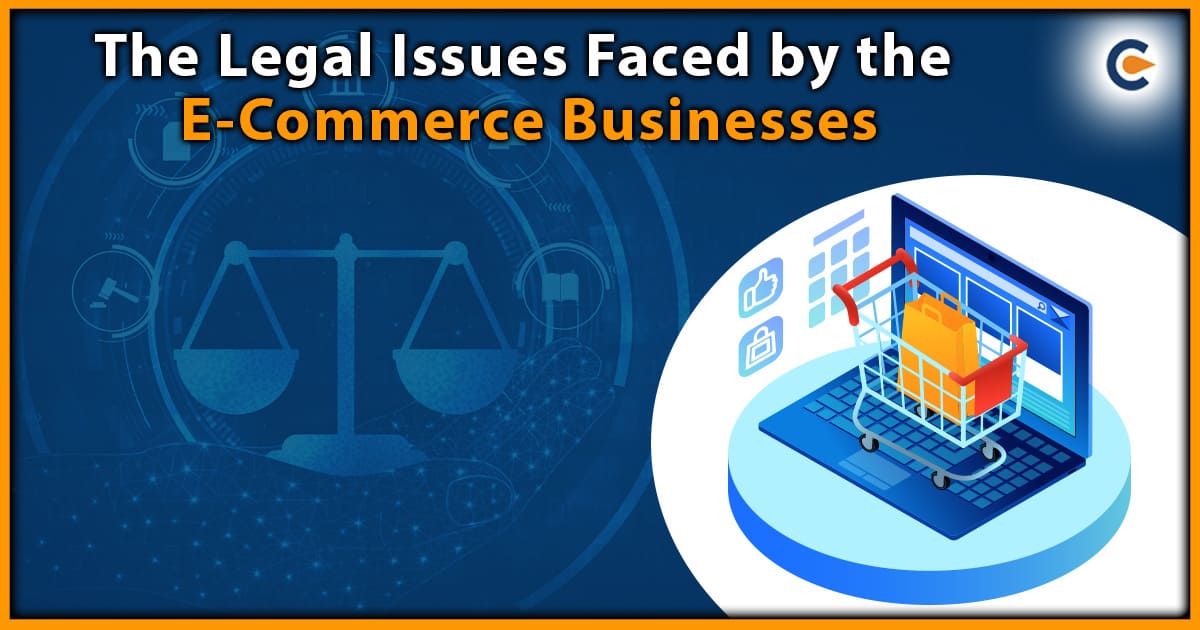E-commerce has become one of the most popular and thriving business domains in the current era. With the increased demand for online shopping, e-commerce has grown remarkably over the last few years. While e-commerce has opened doors for businesses to reach new customers and increase their profitability, it also presents legal challenges they must be aware of. Here we will examine the legal issues that e-commerce businesses face, including privacy and data protection, intellectual property, consumer protection, and cybercrime.
What is E-Commerce Business?
E-commerce refers to the buying and selling products or services over the Internet. In recent years, E-commerce has become more prevalent in India as many businesses are moving online to cater to a broader market. The growth of E-commerce in India has been supported by widespread internet penetration and a growing middle class.
The Indian E-commerce market has seen remarkable growth in recent years, with online retail sales expected to reach $120 billion by 2020. Several factors have donated to this growth, including rising disposable incomes, increasing internet and smartphone penetration, and the government’s Digital India initiative. The most significant advantage of E-commerce is that it allows businesses to reach a broader audience at a lower cost than traditional brick-and-mortar stores.
E-commerce websites also provide greater convenience to consumers, permitting them to shop from the comfort of their homes. Online marketplaces like Amazon, Flipkart, and Snapdeal have become popular platforms for buyers and sellers to interact. In addition, the rise of payment gateways like Paytm, PayPal, and others has made online payments more accessible.
Another significant advantage of E-commerce is the data it generates. Online buying behaviour can be analyzed to provide insights into customer preferences and optimize business strategies. E-commerce companies can use this data to improve their marketing techniques and product offerings.
One of the challenges for E-commerce in India is infrastructure and logistics. India’s logistics infrastructure is still developing, and delivering products to remote areas can take time. Additionally, counterfeit and fake products online have been a problem.
To address these issues, the Indian government launched the National E-commerce Policy, which aims to create a more supportive environment for E-commerce. This policy includes measures to improve infrastructure, streamline regulations, and promote the growth of small and medium businesses.
Thus, E-commerce is a growing industry in India with significant potential for growth. As more businesses move online, the industry will evolve and mature. With the proper support from the government, E-commerce can become an essential component of India’s digital economy, helping to drive economic growth and job creation.
What are the Legal Issues Faced by the E-Commerce Businesses?
One of the significant legal challenges that e-commerce businesses face is privacy and data protection. E-commerce websites collect sensitive customer information, such as their names, addresses, contact details, and payment information. This data is often stored in databases susceptible to hacking or cyber-attacks. As such, companies must comply with data protection laws to avoid any legal consequences. One example is the General Data Protection Regulation (GDPR) introduced in the EU, which requires companies to gain explicit consent from customers when collecting their data. Failure to comply with such directives can result in fines and reputational damage.
Another area of concern for e-commerce businesses is intellectual property (IP). The Internet is notoriously known for piracy, and e-commerce websites are not exempted. E-commerce businesses must be able to protect their IP rights and prevent others from infringing on them. They should ensure that they own the copyright and trademark of their products or services and that no other business uses their intellectual property. If infringement occurs, e-commerce businesses should seek legal action against those who infringe on their intellectual property rights.
Consumer protection is another significant legal issue for e-commerce businesses. Online transactions are inherently risky since the customer needs help physically verifying the product’s authenticity or quality. As such, e-commerce businesses should provide product information, including the product’s features, pricing, and availability, to ensure the customer is thoroughly knowledgeable of the product’s specifications. E-commerce websites should also have a clear refund and return policy and provide support to solve customer issues. The legal consequences for businesses that fail to comply with consumer protection laws include fines, reputational damage, and even the revocation of licenses.
The last significant legal issue for e-commerce businesses is cybercrime. Cybercriminals often use e-commerce websites to access sensitive information like customers’ payment details, passwords, and other personal data. Cyber-attacks can take many forms, from hacking, phishing scams, identity theft, and ransomware attacks. Therefore, e-commerce businesses must proactively ensure their website security is up-to-date and protected against cyber-attacks. They should also ensure that their employees are trained in cybersecurity awareness and take swift action to mitigate any threats to their website security.
Most Popular E-Commerce Businesses in India
| Company Name | Type of E-commerce | Key Features | Annual Revenue |
| Amazon India | Online Marketplace | Wide range of products, reliable delivery, competitive pricing | $21.3 billion (2020) |
| Flipkart | Online Marketplace | Largest e-commerce platform in India, a wide range of products, fast delivery | $17.6 billion (2020) |
| JioMart | Online Grocery | Operated by Reliance Industries, a vast network of stores, competitive pricing | N/A (Launched in 2020) |
| Myntra | Online Fashion | Fashion and lifestyle products, innovative designs, easy returns | $500 million (2018) |
| Nykaa | Online Beauty | Wide range of beauty products, exclusive brands, interactive content | N/A (Estimated to be around $300 million in 2020) |
| Bigbasket | Online Grocery | Largest online grocery retailer in India, same-day delivery, quality products | N/A (Estimated to be around $300-400 million in 2020) |
| Pepperfry | Online Furniture | Wide range of furniture and home decor products, hassle-free installation, easy returns | N/A (Estimated to be around $200-250 million in 2020) |
| Lenskart | Online Eyewear | Wide range of eyeglasses and sunglasses, 3D try-on feature, quality guarantee | N/A (Estimated to be around $200 million in 2020) |
Advantages and Disadvantages of E-Commerce Business
As technology evolves, more and more people are shopping online. E-commerce has affected how businesses market and sell products, offering many benefits. However, it also comes with its own set of challenges and disadvantages.
Advantages of an E-Commerce Business
Global reach
One of the most significant advantages of e-commerce is that it allows businesses to reach a global audience. With an online store, businesses can sell products to anyone, anywhere in the world, 24/7.
Cost-effective
Compared to traditional brick-and-mortar stores, e-commerce businesses have lower overhead costs. There is no need to pay rent, utilities or maintain a large inventory of products. It makes it easier for small businesses to compete with larger companies.
Automation
E-commerce platforms have built-in features that automate many processes. For example, the platform can handle inventory management, order processing, and payment processing. It saves time and reduces the chances of error.
Personalization
E-commerce platforms allow businesses to target their marketing efforts more effectively. They can personalize communications to customers based on their buying behaviour and preferences. It can lead to higher customer retention rates and increased sales.
Data collection
E-commerce platforms capture vast customer data, including browsing behaviour, purchase history, and demographics. This data can be used to improve marketing strategies and enhance customer experiences.
Disadvantages of an E-Commerce Business
Lack of personal interaction
One of the most significant disadvantages of e-commerce is the lack of personal interaction with customers. Establishing trust and building long-term relationships with customers can make it challenging.
Security concerns
With online transactions, there is always a risk of fraudulent activity, which can damage a business’s reputation. E-commerce businesses must invest in secure payment processing and data protection measures to ensure customer privacy.
Shipping costs
Shipping costs can be high for e-commerce businesses, especially for oversized items. It can make it difficult to compete with brick-and-mortar stores that offer free shipping or in-store pick-up options.
Technical issues
E-commerce platforms rely on technology, which can sometimes fail. Technical issues can lead to lost sales, reduced customer satisfaction, and damage to a business’s reputation.
Competition
E-commerce is highly competitive, with many businesses vying for attention and customers. A small business may need help to gain visibility amidst larger, more established brands.
Overall, e-commerce can be a profitable and convenient way to sell products online. It offers businesses a global reach, cost-effectiveness, automation, personalization, and access to valuable data. However, e-commerce also comes with challenges, including the need for more personal interaction, security concerns, shipping costs, technical issues, and intense competition. Businesses must carefully weigh the advantages and disadvantages before deciding whether to invest in e-commerce.
The Acts and Provisions Related to Legal Issues Faced by E-Commerce Businesses
Information Technology Act, 2000
It is the primary legislation that governs e-commerce transactions in India. This act gives electronic records the same legal recognition as paper records, and electronic signatures are considered valid.
Consumer Protection Act, 2019
E-commerce businesses must comply with consumer protection laws in India, which are set out in the Consumer Protection Act of 2019. The act protects consumers against unfair trade practices and defective products and intends to promote market competition.
Reserve Bank of India (RBI) Guidelines
The RBI has issued guidelines for payment services offered by e-commerce platforms in India. The guidelines pertain to areas such as the minimum net worth requirement of payment service providers, electronic payment methods, and maintaining records by payment service providers.
Cybercrime laws
E-commerce businesses must also comply with cybercrime laws in India, intended to curb cybercrime activities such as hacking, identity theft, and spreading viruses or malware.
Goods and Services Tax (GST) Act, 2017
E-commerce businesses selling goods or services are subject to the GST Act, which imposes a tax on the supply of goods and services. The GST Act requires e-commerce platforms to register under GST and collect appropriate taxes from customers.
Copyrights and Trademarks Act, 1957
E-commerce businesses may face legal issues related to infringement of copyrights and trademarks. The Copyrights and Trademarks Act of 1957 protects the owners of intellectual property rights and allows them to take legal action against infringers.
Data Privacy Laws
The Personal Data Protection Bill 2019 is yet to be passed by the Parliament, but The Information Technology Act of 2000[1] contains provisions directed at data privacy and protection.
The Indian Contract Act, 1872
This act governs contracts made electronically and provides guidelines for the enforceability of electronic contracts.
Indian Penal Code, 1860
This act defines various cybercrimes such as hacking, cyberstalking, identity theft, and data theft and provides the punishment for these offences.
Information Technology (Intermediaries Guidelines) Rules, 2011
These rules provide guidelines for the intermediaries, such as e-commerce platforms and social media platforms, to protect the privacy and data of users.
The Consumer Protection (E-Commerce) Rules, 2020
These rules state the responsibilities of e-commerce businesses towards consumers, such as providing accurate information about the products and services, grievance redressal mechanism, etc.
These acts and provisions are essential for e-commerce businesses to safeguard themselves from legal issues and provide consumers with a secure and trustworthy marketplace.
Landmark Case Laws Related to Legal Issues Faced by E-Commerce Businesses
Shreya Singhal Vs. Union of India (2015)
This case deals with the constitutionality of Section 66A of the Information Technology Act, which criminalized online speech and was struck down by the court.
Amazon Seller Services Pvt. Ltd Vs. Amway India Enterprises Pvt. Ltd (2015)
This case dealt with the issue of trademark infringement by e-commerce platforms.
eBay India Private Limited Vs. Deepak Jain (2013)
In this case, the court held that e-commerce platforms could not evade liability for selling counterfeit products by claiming they were unaware of it.
Tata Sons Ltd Vs. Greenpeace International (2014)
This case deals with the issue of cyber-defamation and the powers of the court to issue injunctions against online content.
K.V. Rajendran Vs. Flipkart Internet Pvt. Ltd. (2017) MANU/KA/2301/2017
This case pertains to the issue of unfair trade practices by e-commerce platforms.
Shrenik Mahajan Vs. Snapdeal.com (2017) MANU/DE/4184/2017
This case deals with the issue of misleading advertisements and false promises made by e-commerce businesses.
M/S Flipkart Internet Pvt. Ltd. LeEco India Technology Pvt. Ltd. & Anr. (2018) MANU/DE/1006/2018
This case pertains to the issue of product liability of e-commerce businesses.
Conclusion
In conclusion, e-commerce has revolutionized how businesses sell their products and services. However, e-commerce businesses must familiarize themselves with the legal aspects of this industry, including privacy and data protection, intellectual property, consumer protection, and cybercrime. By understanding these legal issues, businesses can take proactive measures to ensure they comply with the laws and regulations that govern e-commerce businesses. This approach protects businesses from legal consequences, enhances their brand reputation, and builds customer trust.
Read our Article: Ecommerce Laws In India: A Comprehensive Outlook











